 Petzlover
Petzlover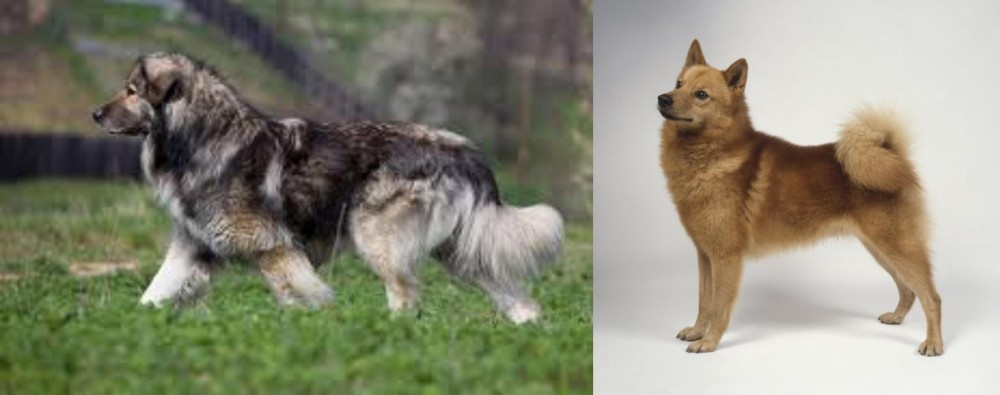 Carpatin is originated from Romania but Finnish Spitz is originated from Finland. Carpatin may grow 23 cm / 10 inches higher than Finnish Spitz. Carpatin may weigh 65 kg / 144 pounds more than Finnish Spitz. Carpatin may live 3 years more than Finnish Spitz. Carpatin may have more litter size than Finnish Spitz. Carpatin requires Low Maintenance. But Finnish Spitz requires Moderate Maintenance
Carpatin is originated from Romania but Finnish Spitz is originated from Finland. Carpatin may grow 23 cm / 10 inches higher than Finnish Spitz. Carpatin may weigh 65 kg / 144 pounds more than Finnish Spitz. Carpatin may live 3 years more than Finnish Spitz. Carpatin may have more litter size than Finnish Spitz. Carpatin requires Low Maintenance. But Finnish Spitz requires Moderate Maintenance
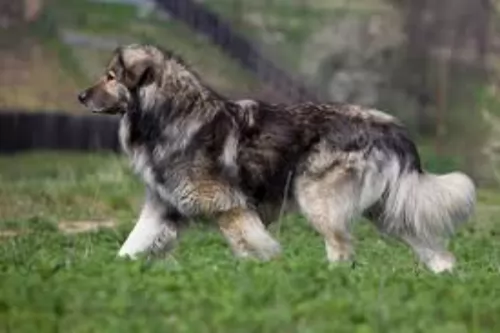 The Carpatin, known also as the Carpathian Shepherd Dog or Romanian Shepherd, is a large breed dog known for his guarding- and watch-dog abilities. Information about these dogs dates back to the 1800s, and much later, in March 1998, fans of the dog founded the Carpathian Shepherd Dogs Club.
The Carpatin, known also as the Carpathian Shepherd Dog or Romanian Shepherd, is a large breed dog known for his guarding- and watch-dog abilities. Information about these dogs dates back to the 1800s, and much later, in March 1998, fans of the dog founded the Carpathian Shepherd Dogs Club.
It is believed that the different Carpathian Shepherd Dog breeds are descendants from dogs that were developed thousands of years ago in Mesopotamia. Documentation of the origins of the dog are rare but it is thought that they are probable descendants of Lupomolossoids. However in 2005, it was finally recognized by the Federation Cynologique Internationale, and in 2006, it was recognized by the United Kennel Club. However, it is still a rare breed outside Romania.
 The “barking Bird Dog” or Finnish Spitz was Developed in Finland. The breed is fearless and small with a different style than many other hunting dogs. He style of tracking is unusual and he indicated his quarry by barking. He was bred to hunt all sizes of prey from as large as bears to as small as squirrels. He was called the “Barking Bird Dig” because he pointed at the prey by barking and giving the hunter knowledge of the prey and an easy approach to it. In Finland, the Spitz is still a hunting dog. In 1979 The Finnish Spitz became the national dog of Finland.
The “barking Bird Dog” or Finnish Spitz was Developed in Finland. The breed is fearless and small with a different style than many other hunting dogs. He style of tracking is unusual and he indicated his quarry by barking. He was bred to hunt all sizes of prey from as large as bears to as small as squirrels. He was called the “Barking Bird Dig” because he pointed at the prey by barking and giving the hunter knowledge of the prey and an easy approach to it. In Finland, the Spitz is still a hunting dog. In 1979 The Finnish Spitz became the national dog of Finland.
Spitz-like dogs have been present in Finland for over 8000 years. It is believed that dogs living in higher latitudes had more in common with the Taymyr Wolf od North Asia than with the gray wolf. Tests indicate that the chance of the Spitz being related to the Taymyr is between 1.4&a and 27.3%. The Taymyr is extinct today. This shows that the present day dog descends from more than one type of wolf and more than one area. The Spitz was a favorite of the Finno-Ugrian tribes as he helped them find food. These tribes were pretty isolated until 1880. Then the Spitz were mated with other dogs and were almost extinct as a breed separate from all the other local dogs.
However, like many other breeds the Finnish Spitz found a savior. A Finnish huntsman, named Hugo Roos, noticed the native Finnish Spitz while he was hunting up North. He decided to breed dogs that were genuine Finnish Spitz without the blood of other breeds mixed in. After thirty years the current day Finnish Spitz was born.The latest breed standard was confirmed by the Love Finnish Kennel Club in 1996.
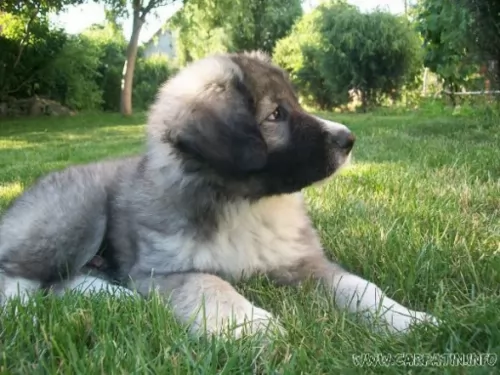 The Carpatin is a large breed dog, standing at 65 to 73cm in height and weighing between 32- and 80kg. The skull of the dog is wide and domed, the ears medium set and floppy. The neck is strong and muscled, the legs strong and straight, the chest deep.
The Carpatin is a large breed dog, standing at 65 to 73cm in height and weighing between 32- and 80kg. The skull of the dog is wide and domed, the ears medium set and floppy. The neck is strong and muscled, the legs strong and straight, the chest deep.
The tail of the Carpatin is long, bushy and high set and his coat is double layered, medium length and pale fawn in color with light grey to black shades being seen as well.
The Carpatin is patient, loving and protective. This is a strong-willed dog who is independent and fairly easy to train as he is intelligent.
It is a good idea to have him trained and socialized as this brings out the best in him. He is a patient and affectionate dog and he’ll get on well with children and tolerate other pets in the home.
They are wary of strangers and become vocal, barking and growling and taking their guard dog role seriously with strangers around.
 The Finnish Spitz is balanced and symmetrical in body and females are longer than males. They have a very distinguishable prick, foxy ears and face. They have a smiling expression and a curved tail. They are a golden-red color with a double coat. The under coat is dense and soft While the top coat is stiff. Puppies often look like little red fox cubs. When born they are black, grey or brown with a lot of black. As an adult the pups grow up to be a mix of fawn and dark black. Lips, nose and rims of the eyes should be black.
The Finnish Spitz is balanced and symmetrical in body and females are longer than males. They have a very distinguishable prick, foxy ears and face. They have a smiling expression and a curved tail. They are a golden-red color with a double coat. The under coat is dense and soft While the top coat is stiff. Puppies often look like little red fox cubs. When born they are black, grey or brown with a lot of black. As an adult the pups grow up to be a mix of fawn and dark black. Lips, nose and rims of the eyes should be black.
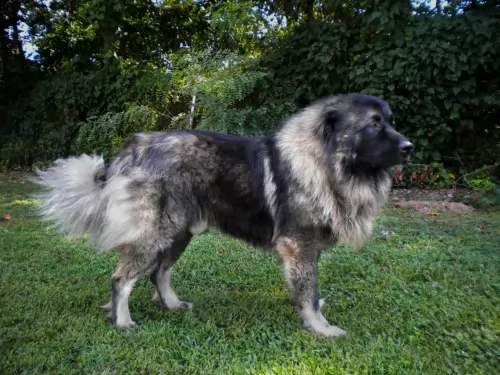 The Carpatin is a big, independent dog who loves his human family. He will guard them too and has all the intelligence and skills to be instinctively alert to danger. Territorial, he makes an excellent watchdog.
The Carpatin is a big, independent dog who loves his human family. He will guard them too and has all the intelligence and skills to be instinctively alert to danger. Territorial, he makes an excellent watchdog.
He isn’t too social around strangers, but with training and socialization he becomes more relaxed and amicable. He responds well to training, especially when he has a firm, strong handler and owner.
Used to being a herding- and working dog, he is happiest when kept busy and isn’t a dog to use essentially for guarding only as he can become aloof and aggressive. Treat him well and have him trained and socialized and you’ll have a wonderful guardian and companion.
 Very child friendly – loves to play with children as long as the children pay attention to them. If not, the Spitz will go elsewhere.
Very child friendly – loves to play with children as long as the children pay attention to them. If not, the Spitz will go elsewhere.
They are independent thinkers and close to family but not strangers. They often “yodel” instead of howl.
Needs to be with people, bonds deeply with his humans. Most get along well with other dogs but because of their hunting instinct they are not good with small pets or birds.
They are smart and learn easily. They are great athletes and learn games and competition well.
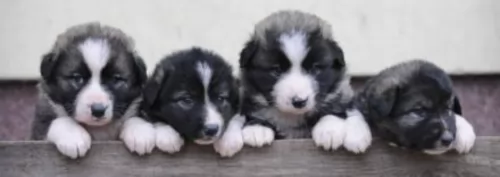 The beautiful Carpatin dog can live to be a healthy 12-14 years if you feed him nutritious foods, provide him with clean water every day, exercise him, give him a dry, warm bed and give him loads of love, attention and care.
The beautiful Carpatin dog can live to be a healthy 12-14 years if you feed him nutritious foods, provide him with clean water every day, exercise him, give him a dry, warm bed and give him loads of love, attention and care.
However every dog can become ill and with the Carpathian Shepherd Dog you certainly want to be aware of ear and eye infections, hip dysplasia and skin disorders.
 Typically, a somewhat healthy breed, the Finnish Spitz does struggle with a few genetic concerns. They have been known to suffer from:
Typically, a somewhat healthy breed, the Finnish Spitz does struggle with a few genetic concerns. They have been known to suffer from:
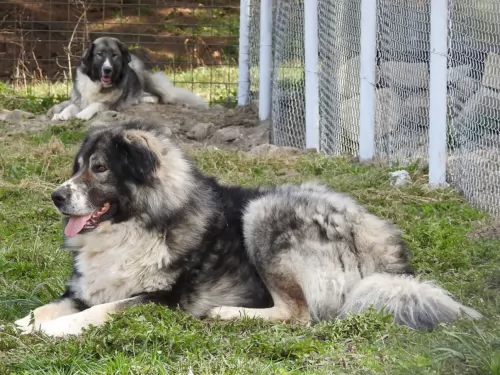 Despite his longish coat, the Carpatin is a low to moderate maintenance dog. To avoid tangles and matting, you’ll need to brush his hair at least twice a week. He won’t however require professional grooming.
Despite his longish coat, the Carpatin is a low to moderate maintenance dog. To avoid tangles and matting, you’ll need to brush his hair at least twice a week. He won’t however require professional grooming.
Dogs with floppy ears will need to have the ears checked to ensure they remain fee of moisture and wax buid-up. The ears can be easily infected when left uncleaned. The nails and teeth should also be checked. Canine toothpaste and brush can help to prevent plaque build-up which can cause gum disease and tooth decay. Not only that, dental disease can lead to other health issues in other parts of the body.
The Carpatin is a medium- to high energy level breed dog and he will therefore need a good amount of exercise to keep him healthy and content. Rope him in to your activities whether you go jogging or cycling. Put him on a leash and take him with – he’ll love it. Dogs who are allowed to be active and part of the family are simply better dogs.
Your Carpatin’s weight, age and activity levels will guide you as to what food is best for him. He needs nutritious food and if you’re unsure how to choose, your veterinarian can advise you on what to look for.
Apart from proteins, your dog needs fats, fiber, carbohydrates, minerals and vitamins. As your dog ages, he or she will go through different life stages, and you want to be sure of ensuring your dog is getting everything he needs to ward of disease and stay happy and healthy.
Make sure your 4-legged canine friend always has a bowl of fresh, cool water available to him.
 Don’t overfeed the little guy. The Spitz had a good appetite for a dog its size and can gain weight quickly . Feed twice a day about 1/8th of a cup.
Don’t overfeed the little guy. The Spitz had a good appetite for a dog its size and can gain weight quickly . Feed twice a day about 1/8th of a cup.
The same advice hold for the adult dog. Feed 1/4th of a cub of high quality dry food twice a day.
When the Spitz is a puppy you should limit strenuous exercise and jumping. Don’t spay neuter at too young an age. Wait until they are mature at 3-5 years of age.
Again do not exercise vigorously at too young an age. When older the Finnish Spitz will need a yard to run in and exercise to satisfy his hunting instincts. A long walk every day is a must.